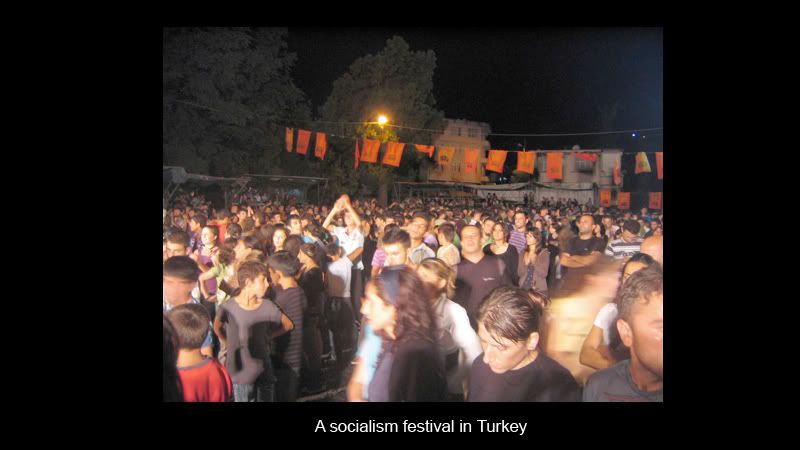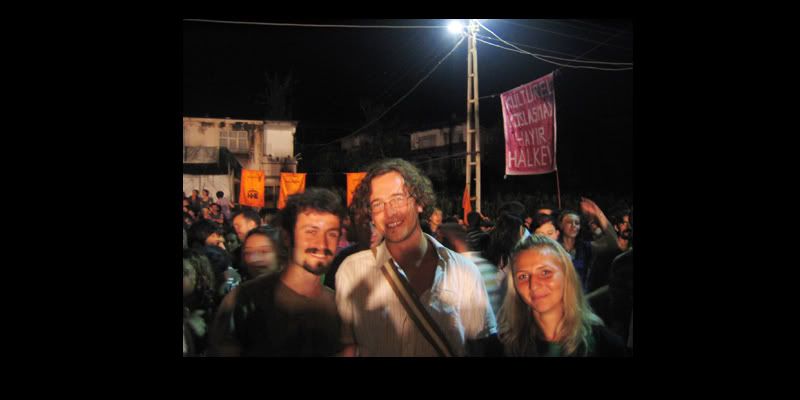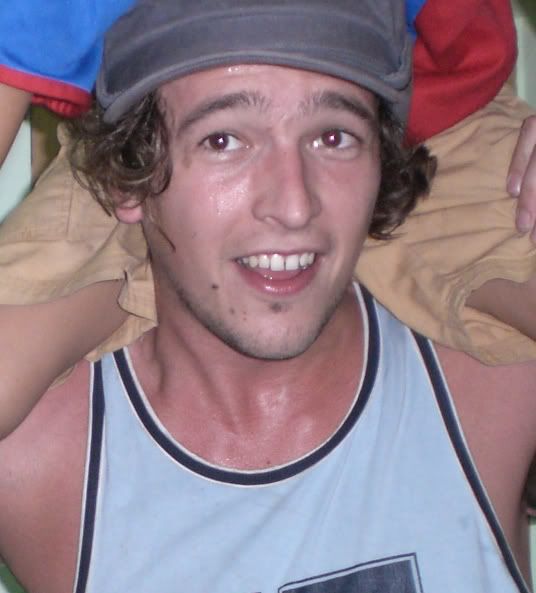Turkey - The town of Hopa, in the district of Artvin. 10kms from the Georgian border.
By Dan
August 13th, 2007
DRIVING through the Turkish night to try and hit the Georgian border, Lovey and OJ noticed some kind of festival and pulled over.
I had been asleep in Fez and felt groggy.
“It’s a corn cult” OJ said.
Ok, I thought, it certainly felt liker a cult, surrounded by strangeky dressed Turks, with the sound of chanting in the air. Later I would learn they had called it a corn cult because of the high cornfields that surround the place. But at the time I thought it must be some kind of religio-social celebration - a bit like harvest festival.
I was horribly wrong.
An amphitheatre had been created in some urban wasteland, with four rough wooden stands set up for the crowd.
A old man at the front played sitar and chanted in a deep voice that carried down my spine and earthed through my feet. The organisers had faced the stage lights towards the crowd, so the singer was impossible to make out behind the dazzling brightness. It felt like I was watching a performance by the sun, or the Son.
It was a lot like a festival- damp, crowded, with loud music and men and women in a state of ecstasy, looking ridiculous in rain macs, arms aloft singing at the top of their voices. The smell of tobacco smoke hung in the air, but there was no alcohol on sale.

I separated from the rest of the group but quickly attracted the attention of the locals who first attempted to interrogate me in Turkish, then wheeled out an English speaker.
Anil Yenigul, a 19-year-old English student, told me that in fact it was the fourth annual socialism festival, organised by the local communist party. An occasion to celebrate and spread socialism, which was strangely popular in this small border town of 20,000.
He acted as a translator as I quizzed the leaders of the party.
What are people here for?
“They believe in a society in which socialism lives.” He didn’t say ‘we believe’ so I guessed he wasn’t a member of the party.
“They are not a party”, he explained, “they are a movement, a group, but still they want to govern society.
“They want revolution. Their main aim is to achieve revolution to organise Turkey into a socialist society.”
But how will you achieve that, I asked.
“With the fire of revolution.”
I tried to get an explanation but I looked up from my notes and saw I was surrounded by angry, spitting, young men, shrieking in Turkish demanding that their voice be heard.
My translator was overwhelmed.
“We are Mao’s people.” I heard above the melee, and a Turk thrust his face into mine. “We are Mao. China’s people. Mao, Mao, Mao.”
I could tell that the finer pints of Turkish socialism were beyond my translator, so I asked what the music was.
“Ahhh,” he said, a broad smile forming across his pussie top lip, “Nurettin Rengber. Traditional Turkish folk music. I love him.”
Never before had I seen communists attempting to ferment revolution through the power of traditional folk. Firebrand socialist folk activism. Quite a sight.
Many people were wearing orange, so I asked them whether there were any similarities to the Orange Revolution that had swept through the Ukraine, but they, or I, didn’t understand.
The police were out in force, young recruits wearing full body armour, looking primed for action. They had formed a blockade with trucks near the entrance to the square.
“They are protecting us,” my guide explained, “because fascist attacks may happen. But also, they are the fascists you know,” he grinned.
“In Turkey socialist are in small groups, but here they are very popular.”
One of the police carried an AK47. The army were there too, carrying what looked to my naive eye like a sub-machine gun.
“MP5”, Lovey told me later, “Heckler and Koch.”
Americans know about guns.

I wandered through the crowd with a growing entourage.
They wheeled out the local girls and suddenly I was dancing. Everyone joined hands, insistent that I form a circle with them – not my forte, but I smiled and tried to hide my embarrassment.
“Are you a socialist?” I asked one of the girls, in an effort to gauge the political activism of the women.
“What?” she lent in closer, and I hunched down to meet her ear.
“ARE YOU A SOCIALST?” I shouted above the twanging sitar and booming voice.
“Thank you,” she replied, fluttering her lashes and retreating to giggle with her friends.
“Where are you staying tonight?” one of the braver girl’s stepped forward.
“errr…Georgia.” We were planning to cross the border, thinking it would be quicker late at night.
“Yopra?” more giggles.
My new friends left me with a traditional Turkish goodbye – touching each cheek against mine, an intimate and welcome gesture. I withdrew just in time from kissing Anil’s oily skin; we’re not in France.
As we left the police appeared ready to break the place up – riot gear and shields at the ready, standing in formation near the blockade. They were only kids – late teens at most, but you could tell they were ready to crush what ever they were aimed at – socialists, fascists, liberals, Islamists. They would use their batons as they were told to.
And that’s what we pay the police for.
It’s illegal to film the military in Turkey, and they shouted when I tried to photograph them.
A local journalist, Sener Aslibay, saw my clumsy attempts, and took my arm: “It’s better that you leave now. I think there could be a problem with Gendarme.”
“Why”
“They are on opposite sides you know,” he replied, meaning the socialist festival-goers and the ‘fascist’ police and army.
“What will happen?”
He shrugged and declined to elaborate, but the growing roars of the departing partiers, and the sight of the gendarmes armoured and primed for a clubbing was enough. I imagined them sharpening bayonets.
My new friend offered me a place to stay, and a meal, but I told him we were heading to Georgia tonight.
“You know in Georgia it is not safe?” a statement phrased as a question from Sener, who looked unsure about us leaving.
“Why?”
He shrugged, “They are poor. They are thieves. You just be careful.”
But then he revealed his hand: “Have you ever been to Georgia?” I asked.
“No. I know nothing of Georgia.”
Just another scare merchant. If I had listened to all the people who gave me similar advice I would probably not have got out of bed in Shepperton.
There was a split in the group over crossing the border. It was late, nearing midnight. The ground was soggy and we had made many socialist friends who, with typical Turkish generosity, had offered us food and shelter.
Why cross into an unknown and possibly dangerous country late at night, with nowhere to stay, only to pitch a tent at the side of the road?
Timing, schedule, quicker to cross now, scare stories- ran the counter argument.
It won.
We crossed late and headed to Batumi.
Ends
mrdanmurdoch@gmail.com


No comments:
Post a Comment